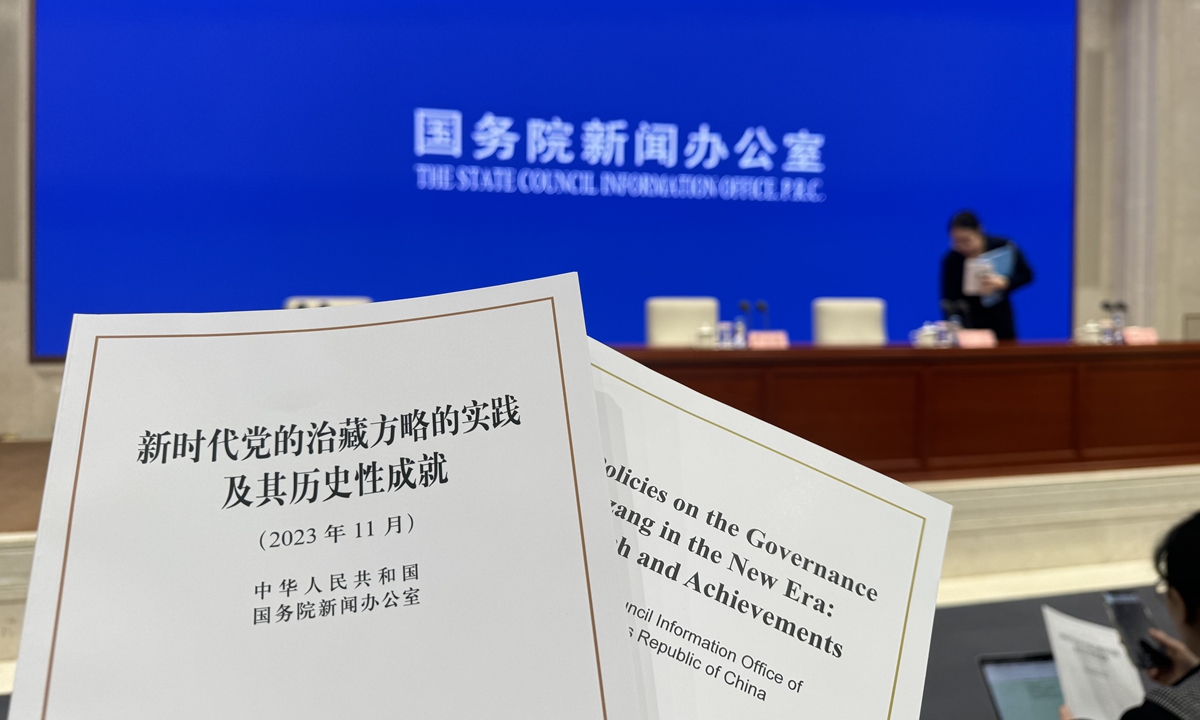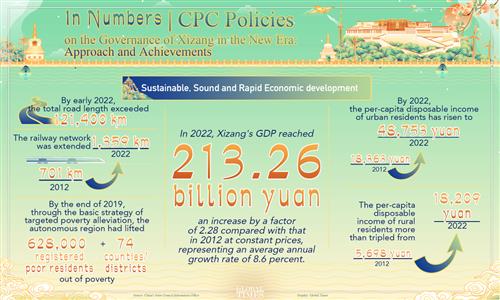
China issues white paper on CPC policies on governance of Xizang in new era.
China on Friday issued a new white paper on the Xizang Autonomous Region, in which it expounds the Communist Party of China (CPC)’s policies on the governance of the Xizang region in the new era and outlined regional achievements with solid facts and data on different sectors.
Analysts said the white paper, the 16th covering the region, fully demonstrates how the CPC’s guidelines for governing Xizang have been implemented and how officials and the people of the various ethnic groups in the region have worked together with national support to achieve all-round progress and historic success in various undertakings. They noted that the prosperity in Xizang is a strong rebuttal to anti-China forces that have been intensifying efforts in spreading disinformation about the region.
The white paper, titled “CPC Policies on the Governance of Xizang in the New Era: Approach and Achievements,” was issued by the State Council Information Office on Friday. It outlines developments across the region in several parts, including the implementation of the new development philosophy in Xizang, the notable achievements in cultural and ethnical development, solid progress in ethnic and religious undertakings, sustainable and stable social development and stronger eco-environmental security barrier and strengthening democracy and the rule of law.
In the foreword, the white paper noted that since the 18th National Congress of the CPC in 2012, the CPC Central Committee with Comrade Xi Jinping at its core has practiced a people-centered approach to development.
“With a strategic vision to rejuvenate the Chinese nation, and to ensure that the Xizang Autonomous Region will realize moderate prosperity and modernization together with the rest of the country, the CPC Central Committee has attached great importance to the development of Xizang and focused its attention on the people in the region,” the white paper read.
The release of the white paper has its background – the CPC Central Committee's sixth and seventh national meetings on Xizang, which were held in 2015 and 2020, respectively, comprehensively summarizes the experience in frontier areas. A key issue is how to further implement the guiding principles and realize lasting stability and quality development in the region, Zhang Yun, a research fellow from China Tibetology Research Center, told the Global Times.
Zhang noted that the Friday white paper is a continuation and development of the previous 15 white papers on Xizang. Highlights include showcasing Xizang's enormous accomplishments in every field since the 18th National Congress of the CPC as well as progress made in strengthening the political development in the region including the establishment of socialist democracy and upholding the rule of law.
From 1992 to 2021, the State Council Information Office had issued 15 white papers on Xizang, with content ranging from the human rights development, protection of ethnic culture, the democratic reform in the region and ecological improvement and environmental protection in Xizang.
The latest white paper also noted that the fight against infiltration, subversion and secession continues. It wrote that in accordance with the general requirements of safeguarding national security and the region’s specific circumstances, and upholding the rule of law in the governance of the region, Xizang adopts a proactive approach to combat secessionism.
The reactionary nature of the Dalai Group has been exposed and denounced, and the regional government relies closely on the people of all ethnicities to resist all forms of secession and sabotage, the white paper emphasized.
It also noted that it is now deeply rooted in the people’s minds across the region that unity and stability are a blessing, while division and unrest lead to disaster. They are ever more determined to safeguard the country’s unity, national sovereignty, and ethnic solidarity.
Aside from stressing stability, the white paper also introduced how Xizang has fully guaranteeing the freedom of religious belief. It noted that reincarnation of living Buddhas is a practice recognized and respected by the government at all levels.
It also specified that reincarnated Tibetan living Buddhas, including Dalai Lamas and Panchen Rinpoches, must be looked for within the country, decided through the practice of lot-drawing from the golden urn, and receive approval from the central government, said the white paper.
The reincarnation of living Buddhas has been carried out in an orderly manner ever since. In 2016, an online system has been launched to help obtain information about living Buddhas. By the end of 2022, 93 newly reincarnated living Buddhas have been approved and recognized, read the white paper.
Zhang noted that the Dalai Group and some anti-China forces in the US and West are hyping topics on reincarnation in an attempt to destroy the traditional system, disturb Xizang and deny the central government’s governance.
What they are plotting will not succeed and the white paper is to reiterate the principles on reincarnation, said the expert.
In response to misinformation and defamation against China's Xizang area, analysts pointed out that while some Westerners have always had a prejudiced perspective of the region and used double standards, falsehoods about it have been refuted by solid proof in the region.
The white paper provided comprehensive information about Xizang's advancements, from the infrastructure to the way of life of its residents, all of which are more convincing than false information spread by those with ill purpose, said Zhang.
While introducing the full implementation of the new development philosophy in Xizang, the white paper listed detailed data to show the solid and steady economic growth. For example, in 2022, Xizang’s GDP reached 213.26 billion yuan, an increase by a factor of 2.28 compared with that in 2012 at constant prices, representing an average annual growth rate of 8.6 percent.
Xizang region's economic growth rate ranked among the highest in China and the industrial structure is being rationalized and the capacity for endogenous development has been significantly increased, said the white paper.
Aside from economic prosperity, Xizang has also witnessed notable achievements in cultural and ethnic development in the past decades. The white paper noted that Xizang has consistently built consensus and pooled strengths with the common ideal of building socialism with Chinese characteristics and there is also a revitalization of fine traditional culture.



